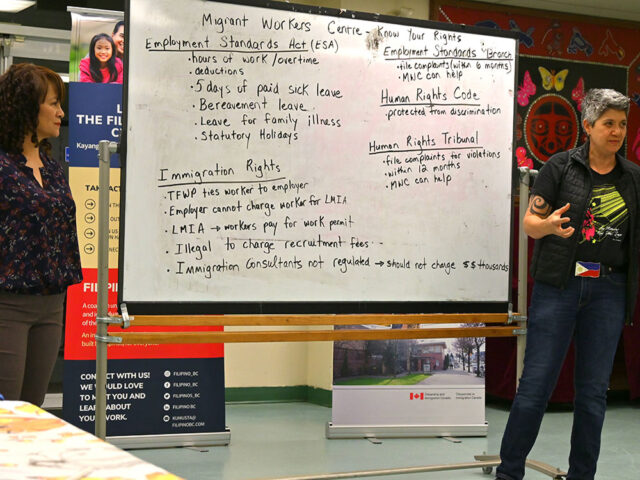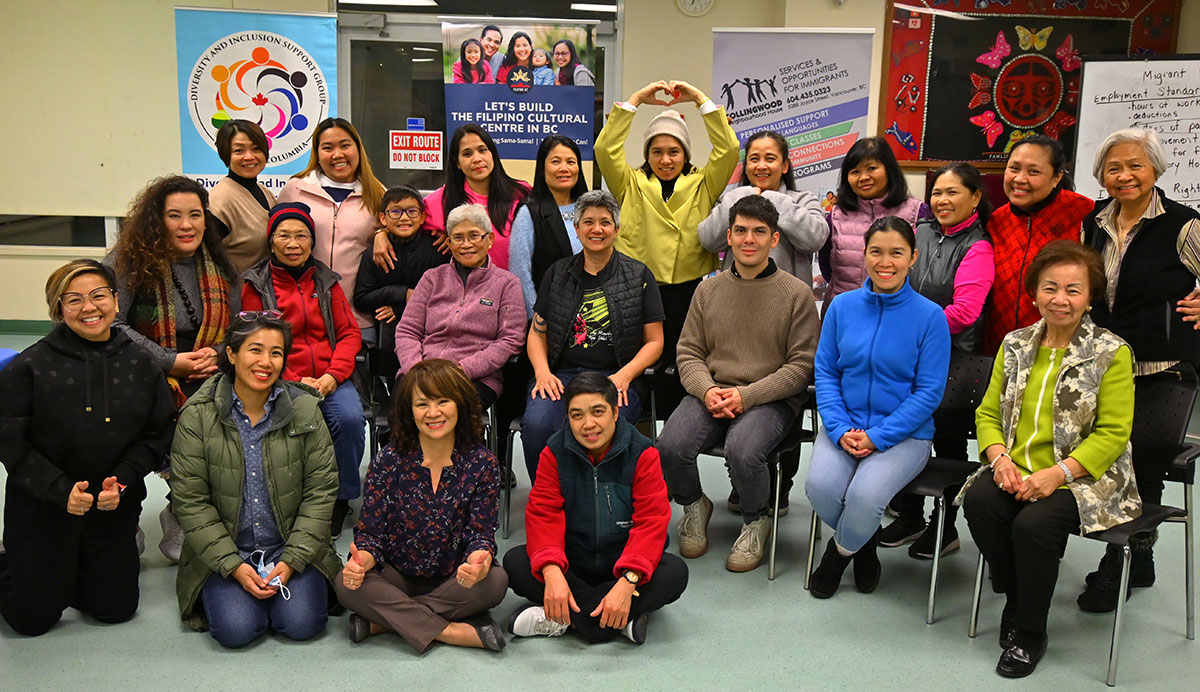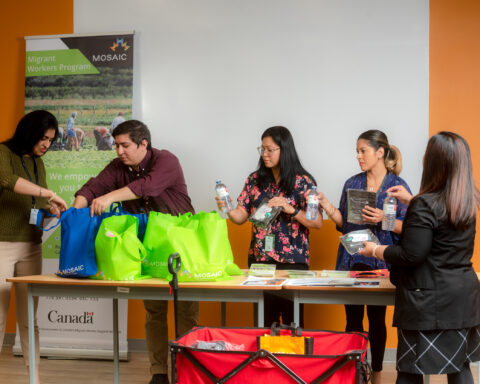by Michelle Gamage, Local Journalism Initiative Reporter, The Tyee
Fragrant bowls of pineapple chicken afritada and sticky slabs of sweet purple biko have been served up on mismatched cookware at the Collingwood Neighbourhood House. Women greet each other with hugs as they walk in the door.
“When Filipinos get together there’s always food, line dancing and karaoke,” one participant jokes. Sure enough, someone starts playing AC/DC and with a whoop, three dancers jump up and start stepping together, cheered on by their friends.

Tonight’s gathering is known as Kusina, the Filipino word for “kitchen.” It’s a grassroots solution to address the poor working conditions foreign caregivers regularly deal with.
Hosted by Filipino BC in partnership with the Collingwood Neighbourhood House, these dinners invite caregivers and their families out every second Sunday evening to eat, build community and introduce women to social services such as legal aid, mental health supports and settlement assistance.
Tonight there are a little over a dozen people in attendance. The largest dinner so far drew 30 caregivers; once people attend, they often invite friends to future dinners.
As the food is dished out, an articling student from the Migrant Workers Centre BC gives a presentation on what legal, labour and human rights people are entitled to in Canada, and what options a person has if, for example, their employer isn’t giving them pay they’re legally entitled to or abusing or sexually harassing them.
It’s a wide-ranging lesson and attendees listen closely, raising their hands to ask clarifying questions — can an employer charge them for covering shifts they miss? How do they can calculate their hourly wage if they’re expected to be living with their employer and on-call six days a week?
There are gasps and murmurs when the crowd learns that, for example, they are entitled to five paid sick days and employers are not allowed to make their employees pay for the $1,000 permit the employer needs to be able to hire foreign workers.
There are more murmurs when they learn there is no legal limit to how much an immigration consultant can charge. One woman says she knows someone who was charged $9,000. Another says they heard $18,000.

Caregivers are often “under-resourced and often disturbingly invisible, with precarious legal status,” Kristina Corpin-Moser told The Tyee over the phone before the event. Corpin-Moser is the project director for Filipino BC and a trained social worker.
Caregivers often live with their employer and work long hours from Monday to Saturday, which makes it hard for them to access government and social services, she says.
Their working conditions got worse during the COVID pandemic, Corpin-Moser adds. “We know instances of gender-based violence, exploitation, physical, sexual, financial and emotional abuse went up in these working environments which had high rates already.”
The United Nations has also been raising the alarm that Canada’s Temporary Foreign Worker Program could create “contemporary forms of slavery” because workers are so deeply reliant on a single employer, who holds enormous power over them.
In a report from this summer, Tomoya Obokata, the UN Special Rapporteur on contemporary forms of slavery, said that while temporary foreign workers are technically able to quit their jobs, in reality they are deeply tied to their employer, which makes them vulnerable to exploitation and abuse, including being forced into debt bondage to pay off recruitment broker fees or made homeless if their employer kicks them out of their employer-provided housing.
Mable Elmore, MLA for Vancouver-Kensington, says the federal government has done some work to improve the status of temporary foreign workers, like allowing workers to bring their spouse and kids with them and saying it will create pathways for undocumented workers to gain permanent residency.
In early November Immigration Minister Marc Miller said he would change regulations that tied a temporary foreign worker to a single employer in response to the UN criticism.
“But precariousness and inequality remain,” Elmore says.
Elmore is parliamentary secretary for anti-racism initiatives to the attorney general and is of Filipino heritage. She says she has been advocating for caregivers and temporary foreign workers since she was in her 20s.
She’s also been attending the Kusina dinners. Tonight, Elmore says, she was “promoted” to cook the afritada. Looking around the room, where people are playing ice-breaker games and shouting with laughter, she smiles and says she’s seen the “transformation” of some of the participants. Caregivers get to build community, make friends, share their stories and — maybe for the first time since they arrived in Canada — have someone listen, Elmore adds.
Moving to Canada for work comes at an enormous personal cost, says Lina Vargas, Kusina program co-ordinator and Filipino BC board member.
Vargas came to Canada in 2004, leaving behind her two small children and career as a midwife to start a job as a caregiver.
She struggled as she tried to carve out a life in a new country and was away from her children until 2010, when they were able to immigrate to Canada too.
“Imagine that loss as a mother,” she says. “We sacrifice so much for their future that it can be hard to take on other challenges.”
Vargas says most of her employers were kind and she enjoyed caring for them as if they were her family. But others exploited her and worked to isolate her, she adds.
She says she worked 16-hour days with no holidays. One employer had her cleaning their friend’s houses until Vargas learned to carefully review her job contract and start advocating for herself.
Caregivers want to prove they can take on any task that’s asked of them, she says. “There’s so many cases of Filipino caregivers being abused because we love to care for people,” she says.
Caregivers will also rarely complain, Vargas says.
“We don’t want our children to absorb our hardships, so we hide it,” she says. “Now I know we need to advocate for ourselves. I want to educate caregivers and employees especially around labour regulations.”
For now, Dec. 10 will be the final Kusina dinner, which have been running since early October. Its organizers say they hope they’ll be able to secure longer-term funding to continue and expand the dinners, so caregivers don’t have to commute in from North Vancouver and Surrey.
“The first step is knowing your rights and supporting one another,” Elmore says, addressing the room. “Remember the saying, ‘if you’re good enough to work, you’re good enough to stay.”
The Local Journalism Initiative supports the creation of original civic journalism that is relevant to the diverse needs of underserved communities across Canada, broadening availability and consumption of local and regional news on matters of civic governance. Launched by the Government of Canada in 2019, the Local Journalism Initiative provides news organizations with funding to hire reporters to cover underserved communities.





